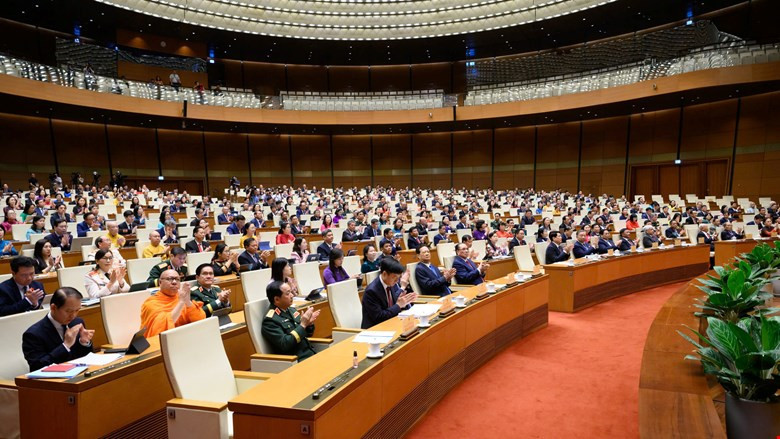
In the draft amended Law on Atomic Energy, the government has proposed transferring the authority to approve investment policies for nuclear power plants from the National Assembly to the Prime Minister.
At the National Assembly session on May 5, during the 9th sitting of the 15th legislature, Deputy Prime Minister Le Thanh Long, on behalf of the government, presented the draft Law on Atomic Energy (amended).
The current Law on Atomic Energy was passed by the 12th National Assembly during its 3rd session on June 3, 2008, and has been in effect since January 1, 2009.
Over the past 15 years, the 2008 law has played a significant role in promoting the peaceful application of atomic energy and strengthening state management in this field.
However, it now reveals several shortcomings - some provisions are outdated, inconsistent with recently enacted laws, and inadequate in aligning with international treaties on atomic energy to which Vietnam is a party. As a result, the law requires thorough revision and supplementation.
The 2008 law includes 76 administrative procedures. The draft amendment reduces this number to 51, eliminating 25 procedures, modifying 9, and retaining 42. This marks a 32.9% reduction in administrative procedures.
The draft law focuses on four core policy areas:
First, encouraging the development and socialization of atomic energy applications.
Second, ensuring radiation safety, nuclear safety and security, and decentralizing state management.
Third, facilitating nuclear inspection activities.
Fourth, strengthening the management of radioactive waste, used radioactive sources, and spent nuclear fuel; enhancing preparedness and response to radiation and nuclear incidents; and ensuring civil liability for nuclear damage.
The revised draft consists of 12 chapters and 73 articles - 20 fewer than the 2008 version, representing a 20% reduction in provisions.
One key amendment is the addition of regulations on inspection, supervision, and administrative penalties (Article 9 of the draft). These adjustments are required for compliance with international treaties to which Vietnam is a party, including the Convention on Nuclear Safety and the Joint Convention on the Safety of Spent Fuel Management and on the Safety of Radioactive Waste Management.
In terms of decentralization, the government proposes that the Prime Minister, not the National Assembly as currently stipulated in the Investment Law and Public Investment Law, be given the authority to approve investment policies for nuclear power plant projects.
The draft law also introduces provisions on nuclear energy development planning, career incentives for workers in the atomic energy sector, and revisions to policies that promote nuclear energy development and application (revising Articles 13, 15, 16, and 17 of the current law) to better align with practical conditions and national priorities.
The Committee on Science, Technology, and Environment has expressed general agreement with the proposed amendments.
However, on the matter of nuclear and radiation damage compensation, the Committee noted that Vietnam has not yet joined the international Convention on Supplementary Compensation for Nuclear Damage. Therefore, a clear policy declaration is needed to serve as a basis for future negotiations and agreements.
Given the international nature and complexity of nuclear liability, and Vietnam’s lack of practical experience in this area, the Committee recommended that all relevant provisions be carefully reviewed in consultation with guidance from the International Atomic Energy Agency (IAEA) and legal experts in civil, public, and international law, as well as insurance, to ensure feasibility and compliance.
Nguyen Thao